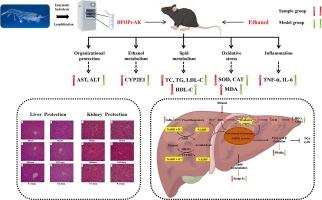High Fischer ratio oligopeptides from Antarctic krill: Ameliorating function and mechanism to alcoholic liver injury through regulating AMPK/Nrf2/IκBα pathways
IF 3.8
2区 农林科学
Q2 FOOD SCIENCE & TECHNOLOGY
引用次数: 0
Abstract
In this study, we devoted attention to the hepatoprotective functions of high Fischer ratio oligopeptides (HFOPs) from Antarctic krill (HFOPs-AK) on alcoholic liver injury of mice. The results indicated that HFOPs-AK significantly improved the pathological state of mice liver and kidney, reduced alanine aminotransferase (ALT) and aspartate transaminase (AST) activities, regulated lipid metabolism, and alleviated the burden on the liver. In addition, HFOPs-AK depicted anti-inflammatory and antioxidant effects by reducing tumor necrosis factor-α (TNF-α) and interleukin 6 (IL-6) contents and increasing superoxide dismutase (SOD) and catalase (CAT) activities to reduce malondialdehyde (MDA) level. The hepatoprotective mechanism of HFOPs-AK was further revealed by quantitative reverse transcription PCR (RT-qPCR) analysis, and the results proved that HFOPs-AK had the ability to stimulate the adenosine 5‘-monophosphate-activated protein kinase (AMPK)/nuclearrespiratoty factor 2 (Nrf2)/inhibitor of NF-κB (IκBα) signaling pathways, thereby regulating the expression levels of downstream factors. The activation of these signaling pathways is essential for the regulation of lipid metabolism as well as anti-inflammatory and antioxidant functions. This finding offers a novel approach for the development of innovative hepatoprotective agents utilizing HFOPs-AK.

来自南极磷虾的高费舍尔比寡肽:通过调节 AMPK/Nrf2/IκBα 通路改善酒精性肝损伤的功能和机制
本研究关注了南极磷虾中的高费舍尔比寡肽(HFOPs)(HFOPs-AK)对小鼠酒精性肝损伤的保肝作用。结果表明,HFOPs-AK能明显改善小鼠肝脏和肾脏的病理状态,降低丙氨酸氨基转移酶(ALT)和天门冬氨酸转氨酶(AST)活性,调节脂质代谢,减轻肝脏负担。此外,HFOPs-AK 还具有抗炎和抗氧化作用,能降低肿瘤坏死因子-α(TNF-α)和白细胞介素 6(IL-6)的含量,提高超氧化物歧化酶(SOD)和过氧化氢酶(CAT)的活性,从而降低丙二醛(MDA)水平。定量反转录 PCR(RT-qPCR)分析进一步揭示了 HFOPs-AK 的保肝机制,结果证明 HFOPs-AK 能够刺激腺苷-5'-单磷酸激活蛋白激酶(AMPK)/核呼吸因子 2(Nrf2)/NF-κB 抑制因子(IκBα)信号通路,从而调节下游因子的表达水平。这些信号通路的激活对于调节脂质代谢以及抗炎和抗氧化功能至关重要。这一发现为利用 HFOPs-AK 开发创新型保肝药物提供了一种新方法。
本文章由计算机程序翻译,如有差异,请以英文原文为准。
求助全文
约1分钟内获得全文
求助全文
来源期刊

Journal of Functional Foods
FOOD SCIENCE & TECHNOLOGY-
CiteScore
9.60
自引率
1.80%
发文量
428
审稿时长
76 days
期刊介绍:
Journal of Functional Foods continues with the same aims and scope, editorial team, submission system and rigorous peer review. We give authors the possibility to publish their top-quality papers in a well-established leading journal in the food and nutrition fields. The Journal will keep its rigorous criteria to screen high impact research addressing relevant scientific topics and performed by sound methodologies.
The Journal of Functional Foods aims to bring together the results of fundamental and applied research into healthy foods and biologically active food ingredients.
The Journal is centered in the specific area at the boundaries among food technology, nutrition and health welcoming papers having a good interdisciplinary approach. The Journal will cover the fields of plant bioactives; dietary fibre, probiotics; functional lipids; bioactive peptides; vitamins, minerals and botanicals and other dietary supplements. Nutritional and technological aspects related to the development of functional foods and beverages are of core interest to the journal. Experimental works dealing with food digestion, bioavailability of food bioactives and on the mechanisms by which foods and their components are able to modulate physiological parameters connected with disease prevention are of particular interest as well as those dealing with personalized nutrition and nutritional needs in pathological subjects.
 求助内容:
求助内容: 应助结果提醒方式:
应助结果提醒方式:


